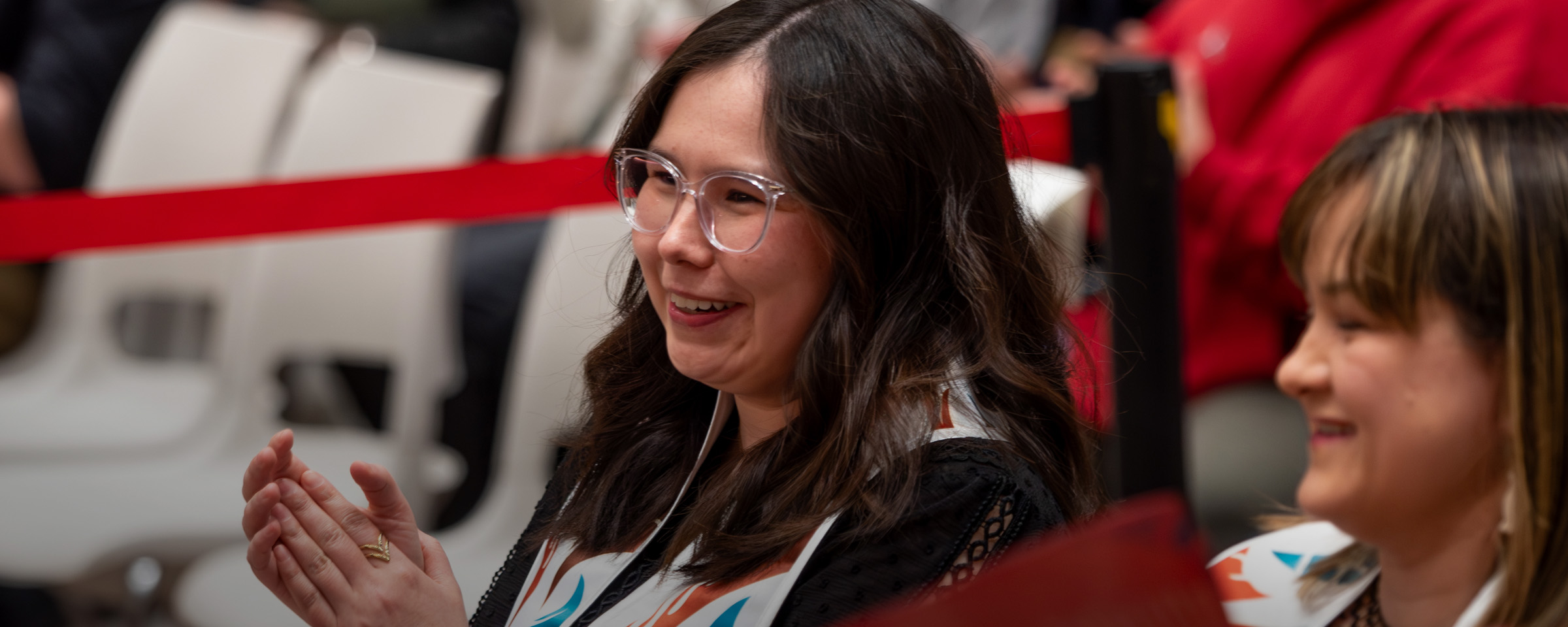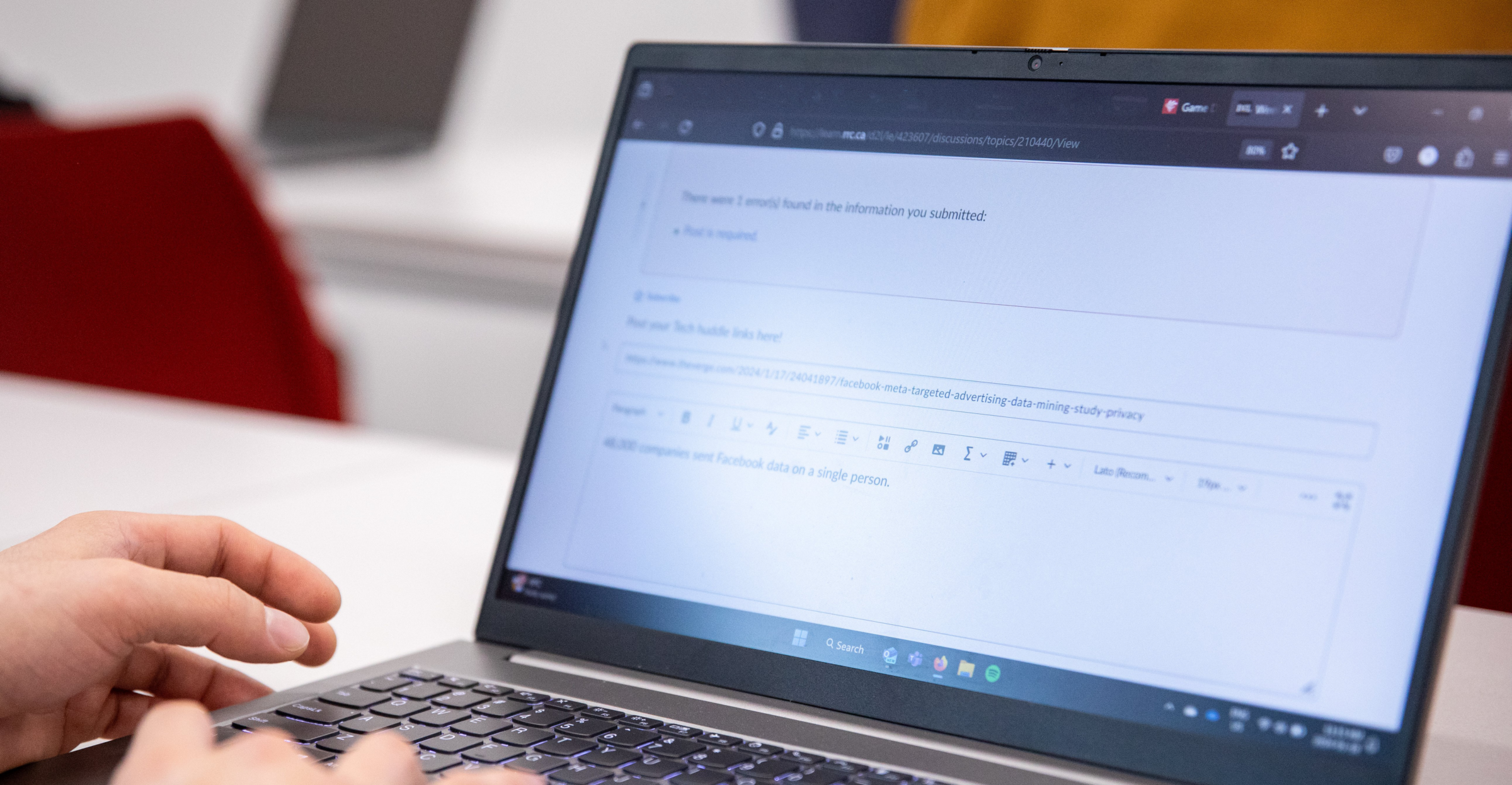Connecting Code and Culture
Information technology is part of our everyday lives, but getting a career started in a technical field can be difficult.
RRC Polytech’s Pathway to Information Technology program offers a meaningful first step for Indigenous students looking to build a future in the field of technology.
Pathway to IT Programs blends foundational academic learning with a strong focus on Indigenous culture, community, and practical applications of technology in Indigenous contexts. Students are introduced to essential learning techniques and technical skills that will equip them to succeed in information technology programs.
Cathrine Van Damme took high school courses such as design drafting, graphic communication, and communication technology and in grade 10, she gained more insight into the field when she took a summer job in the IT department on her reserve. At the time, she was more interested in becoming a graphic designer and had even been accepted into a graphic design program in grade 12. However, she realized that pursuing a diploma in graphic design wasn’t the right fit for her.
Her post-secondary coordinator introduced her to the Pathway to IT Programs and despite spending most of high school preparing for a career in art and design, she discovered that IT, especially web development, offered a creative outlet that she hadn’t expected.
She says that with full-stack development, she can apply her design interests and build and manage the back-end code infrastructure that creates websites. One of her future goals is to build a website for her reserve to share employment opportunities and community news.
Van Damme’s experience in the Pathway to IT Programs is one of many students’ who weren’t entirely sure what to expect – for many, IT combines creativity with a practical application that can be used by anyone.
One experience that stood out to Van Damme was hearing multiple presenters during the Pathway to IT program emphasize the importance of building friendships and connections with peers. At first, she was focused solely on academics and didn’t think much about networking. But in her second term, she realized that having friends in the program made a big difference – not only with getting help on assignments but also with staying motivated to attend class. Making friends helped her feel more engaged, especially during times when classes were online.
Tashina Henry didn’t know what to expect when she went into the program but she knew it would improve her technical skills and in turn give her the tools to improve the skills she was already using in her job as assistant to the director at her reserve’s health centre. The content was relevant to her position where she was already troubleshooting hardware and navigating software – but beyond that, the experience became a journey of self-discovery.
“I finished the program and learned so much more than I anticipated – more about myself than anything. It really gave me the push I needed to come out of my shell. It gave me my voice back,” said Henry.
This was Henry’s first time attending college, and she described the experience as “mind-blowing.” Enrolling in a program designed specifically for Indigenous students helped her feel more comfortable and supported. Since December, she has been working part-time in IT, and she says that combining hands-on experience with her studies has been incredibly rewarding.
“We’re all connected in some way,” she said. “It made it easier to make friends, and it made me feel safe enough to be more outgoing. It’s inspiring to see other Indigenous students taking steps toward their futures. A lot of us are breaking cycles created by residential schools and the intergenerational traumas that followed.”
Henry says she can be stubborn and is drawn to challenging subjects – she prefers to focus on the things she finds most difficult, because that’s where she wants to grow. She is considering pursuing full-stack development because of the challenge it presents.
She’s also interested in programming because of how it can benefit her community. After a conversation with the IT manager at her workplace, she realized tech can have real-world applications beyond websites – like installing sensors in water tanks to measure levels and reduce the need for weekly water truck deliveries. That kind of practical, community-focused tech work encourages her.
One thing that stood out to Henry was how effective and supportive the instructors were. As a child, she moved frequently and often had to change schools, which caused her to miss key units – especially in subjects like math. When she finally settled in Portage la Prairie for high school, she found herself behind and struggling to catch up academically.
“The instructors in this program have been very patient and clear with what they were teaching,” she said. “I really appreciated that.” Their support helped her close some of those educational gaps and build confidence in her abilities.
Beyond academics, participants benefit from career-focused support networks that encourage personal, social, and financial readiness. The goal is not only to help students transition into higher education but to empower them to thrive within it.
Graduates of the pathway program are eligible to apply for reserved seats in high-demand programs such as Application Development and Delivery andIT Operations and launching into rewarding, future-forward careers in technology.
By investing in this pathway, Indigenous students can unlock new possibilities, gain confidence, and build a solid foundation for lifelong success in the tech world.
About Pathways at RRC Polytech
Pathway to Information Technology Programs prepares Indigenous students to take the lead in technology and helps to jumpstart an education in technology. Pathways are exploratory and preparatory, ensuring that Indigenous students have the foundation to start strong in their post-secondary journeys. Pathways are for Indigenous students that haven’t experienced post-secondary education yet or want to build a starting point for an education in a particular industry. Pathway to IT students qualify for the IG Wealth Empower Your Tomorrow Indigenous Scholarship, which provides financial support and mentorship opportunities throughout students’ studies.

